As a homeowner, you rely on your HVAC system to keep you comfortable year-round. However, problems can arise that can leave you feeling hot and bothered (or cold and shivering). This blog post will cover the most common HVAC problems and how to fix them.
“HVAC systems account for approximately 40% of a building’s energy consumption, significantly contributing to energy costs.”
HVAC systems are complex and can develop a range of issues over time. From clogged filters to faulty thermostats, it’s essential to know how to troubleshoot and fix these problems to avoid costly repairs or replacements.
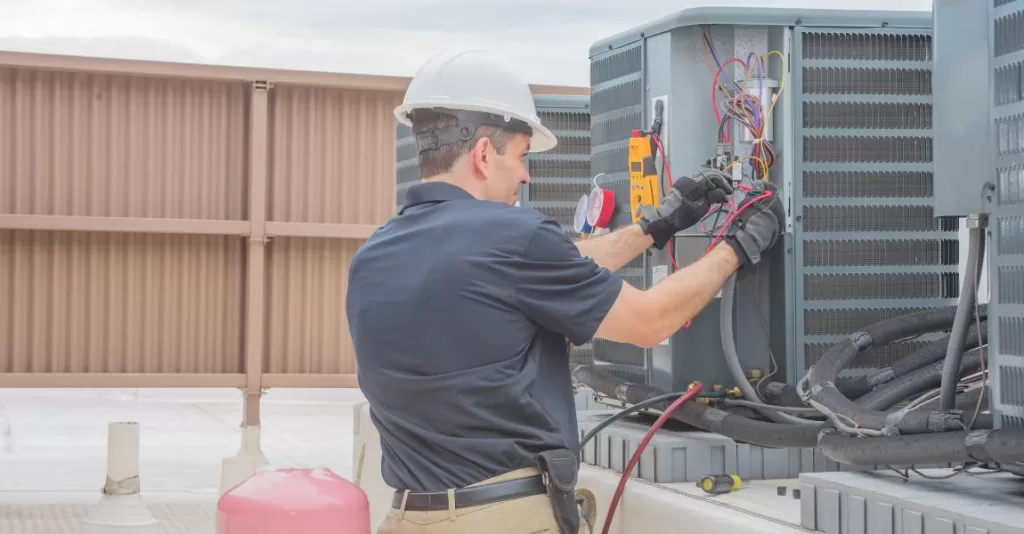
In this article, we will outline five common HVAC problems and provide step-by-step instructions on how to fix them. Whether you’re dealing with a faulty thermostat, a dirty filter, or a malfunctioning blower motor, we’ve got you covered. Keep reading to learn how to keep your HVAC system running smoothly and efficiently.
What are Some Common Problems and HVAC Repairs?
What are the Signs of a Refrigerant Leak?
What Should I Do if my Air Conditioner is Blowing Hot Air?
Air Conditioner is Making Loud Noises
Can a Programmable Thermostat Go Bad?
What is HVAC?
HVAC stands for heating, ventilation, and air conditioning and refers to the systems that regulate indoor temperature and air quality.
HVAC systems are used in residential, commercial, and industrial buildings to provide occupants with a comfortable and healthy environment. Heating systems are used to warm indoor spaces during cold weather, while air conditioning systems cool them down during hot weather. Ventilation systems circulate air and remove pollutants from indoor spaces, ensuring the air is fresh and healthy to breathe.
HVAC systems are typically composed of several components, including a furnace or boiler for heating, an air conditioner for cooling, and a network of ducts or pipes to distribute air throughout the building.
HVAC systems can also include air filters, humidifiers, and dehumidifiers to improve indoor air quality and reduce the risk of respiratory problems.
Proper maintenance and regular inspections are essential to ensure that HVAC systems are functioning efficiently and effectively and prevent costly repairs or replacements.
What are Some Common Problems and HVAC Repairs?
So, what are some common HVAC Problems and How to Fix Them? Heating, ventilation, and air conditioning (HVAC) systems are essential for maintaining comfortable indoor temperatures and air quality.
However, like any other mechanical system, HVAC systems can experience problems and require repairs.
Common HVAC problems include faulty thermostats, clogged filters, circuit breakers, refrigerant leaks, refrigerant levels, dirty evaporator coils, and electrical issues. This article will discuss some common problems and HVAC repairs that homeowners may encounter.
Here are some common issues and HVAC repairs:
1. Dirty air filters: Dirty filters can cause reduced airflow issues, which can lead to your HVAC system working harder and less efficiently. This can also cause increased monthly energy bills and lead to premature wear and tear on the system. Changing filters regularly can help prevent this issue.
2. Refrigerant leaks: Refrigerant leaks can cause your HVAC system to lose cooling power. The result of this can be higher energy costs and unnecessary strain on the system. A professional HVAC technician can fix this issue by locating and repairing the leak.
3. Thermostat problems: A malfunctioning thermostat can cause your HVAC system to work improperly. This can lead to temperature inconsistencies, increased energy bills, and reduced comfort levels. A technician can diagnose and repair any issues with your thermostat.
4. Ignition problems: If your HVAC system has trouble starting or staying on, it may be due to ignition component problems. This can be caused by a faulty pilot light or ignition control module. A professional HVAC technician can diagnose and repair these issues.
5. Electrical problems: Electrical damage issues can cause your HVAC system to stop working altogether or can lead to reduced efficiency. These issues may be caused by wiring problems, faulty capacitors, or other electrical components. An HVAC technician can diagnose and repair these problems.
6. Ductwork problems: Leaks or blockages in your air ducts can cause your HVAC system to work harder than it needs to. This can lead to increased energy bills and reduced comfort levels. A professional HVAC technician can inspect your ductwork and make any necessary repairs.
7. Dirty coils: Dirty coils can cause your HVAC system to work less efficiently, leading to higher energy bills. Regular maintenance, including cleaning coils, can help prevent this issue.
8. Fan problems: If your HVAC system’s fan is not working correctly, it can cause reduced airflow and reduced cooling or heating power. A technician can diagnose and repair any issues with your system’s fan.
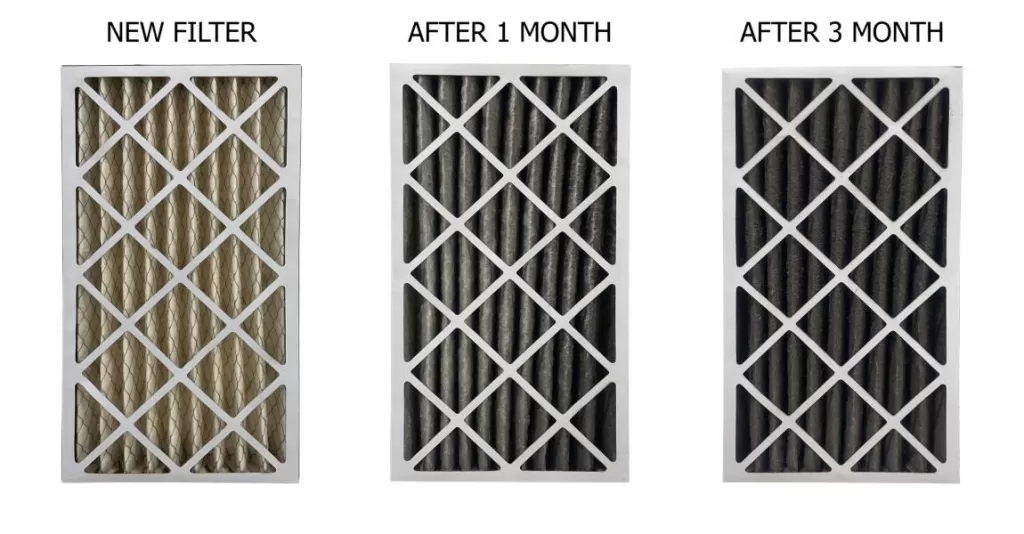
Causes of a Dirty Air Filter
A dirty HVAC (heating, ventilation, and air conditioning) air filter is a common problem that can cause a range of issues with your HVAC system.
A dirty filter can reduce the air quality in your home or office, cause your HVAC system to work harder than necessary, and even lead to costly repairs. Understanding what causes a dirty HVAC air filter is key to preventing this issue and ensuring your HVAC system runs efficiently.
One of the main causes of a dirty HVAC air filter is neglecting to change it regularly. Over time, the filter becomes clogged with dirt, dust, and other particles, which reduces its effectiveness and can cause it to work less efficiently.
Other factors that can contribute to a dirty air filter include pets, smoking, and poor air quality in the surrounding environment.
Here are some common causes of a dirty HVAC air filter:
- Neglecting to change the filter regularly
- High levels of dust and debris in the surrounding environment
- Pets shedding hair and dander
- Smoking in the home or office
- Poor air quality in the surrounding environment
- Running the HVAC system continuously without giving it time to rest
- Using a low-quality air filter that is not designed to handle the specific needs of your HVAC system.
How to Clean an Air Filter
Cleaning an air filter is an important part of maintaining the efficiency and longevity of your HVAC system. Regular cleaning can prevent the buildup of dust and debris that can clog the filter and reduce the flow of air through your system.
Here are some step-by-step instructions on how to clean an air filter:
Step 1: Turn off the HVAC system. Before you begin cleaning the air filter, make sure to turn off the system. This will prevent any debris from being blown into your home while you clean the filter.
Step 2: Remove the air filter. Locate the air filter in your HVAC system and remove it from its housing. If you are unsure where the filter is located, consult your system’s manual or contact a professional for assistance.
Step 3: Vacuum the filter. Use a vacuum cleaner with a soft brush attachment to remove any loose dust and debris from the filter. Work gently to avoid damaging the filter.
Step 4: Wash the filter. If your filter is washable, rinse it thoroughly with water to remove any remaining dirt and debris. Use a gentle detergent if necessary. Be sure to follow the manufacturer’s instructions for washing the filter.
Step 5: Allow the filter to dry. Once you have washed the filter, allow it to air dry completely before reinstalling it in your HVAC system. Do not use the filter until it is completely dry.
Step 6: Reinstall the filter. Once the filter is dry, reinstall it in your HVAC system and turn the system back on. Check the filter regularly and clean or replace it to keep your system running efficiently.
By following these simple steps, you can keep your HVAC system running efficiently and extend the life of your air filter.
Remember to clean your air filter regularly, ideally, once a month, to ensure optimal performance. If you have any questions or concerns about cleaning your air filter, don’t hesitate to contact a professional for assistance.
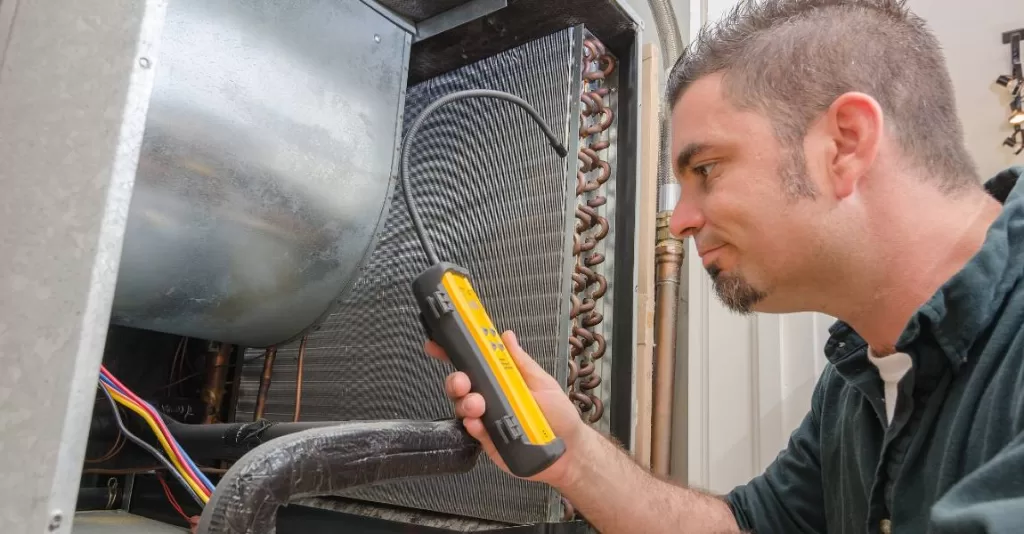
What are the Signs of a Refrigerant Leak?
Refrigerant is a crucial component of any refrigeration system, as it is responsible for absorbing and releasing heat to keep the system functioning correctly.
However, refrigerant leaks can occur over time, leading to various issues such as decreased cooling performance, increased energy consumption, and potential damage to the compressor.
Here are some signs of a refrigerant leak to look out for:
1. Reduced cooling performance – One of the most obvious signs of a refrigerant leak is reduced cooling performance. If your refrigerator or air conditioning system is not cooling as effectively as it used to, it may be due to a refrigerant leak.
2. Hissing or bubbling noises – If you hear hissing or bubbling noises from your refrigeration system, it may indicate a refrigerant leak. This is because refrigerant leaks can cause the refrigerant to escape from the system at high pressure, creating these sounds.
3. Ice buildup or frozen coils – If you notice ice buildup on the coils of your refrigeration system, it may be due to a refrigerant leak. This is because when refrigerant levels are low, the coils can freeze over, reducing cooling performance and potential damage to the compressor.
4. Increased energy consumption – Another sign of a refrigerant leak is increased energy consumption. This is because when refrigerant levels are low, the system has to work harder to maintain the desired temperature, which can lead to increased energy usage and higher energy bills.
5. Unpleasant odors – If you notice unpleasant odors coming from your refrigeration system, it may be due to a refrigerant leak. This is because refrigerant can react with moisture in the air to create a chemical called phosgene gas, which has a distinct odor.
If you notice any of these signs of a refrigerant leak, a professional must inspect your refrigeration system as soon as possible.
A refrigerant leak can cause severe damage to your system if left untreated and can also pose a health risk if phosgene gas is present.
How to fix a Refrigerant Leak
A refrigerant leak in your air conditioning or refrigeration system can cause many problems, including reduced cooling capacity, increased energy consumption, and potential damage to the compressor.
To fix a refrigerant leak, follow these steps:
1. Identify the leak’s location: The first step in fixing a refrigerant leak is to locate the source of the problem. This can be done using a leak detector or by inspecting the system for oil or refrigerant residue signs.
2. Repair the leak: Once you have identified the leak’s location, you will need to repair it. This may involve replacing a damaged or corroded component, such as a pipe or valve, or tightening a loose connection.
3. Evacuate the system: After the leak has been repaired, you must evacuate the system to remove any remaining refrigerant and moisture. This can be done using a vacuum pump and a set of gauges.
4. Recharge the system: Once it has been evacuated, you can recharge it with the correct amount of refrigerant. Be sure to follow the manufacturer’s specifications for the type and amount of refrigerant.
5. Test the system: After recharging it, you must test it to ensure it works properly. This may involve checking the system’s pressures, temperatures, and airflow and monitoring for any signs of leaks or other problems.
6. Routine Maintenance for the system: Regularly maintaining your air conditioning or refrigeration system is essential to prevent future refrigerant leaks. This may involve preventative maintenance by replacing filters, cleaning coils, and checking for any signs of wear or corrosion. Regular maintenance can help extend your system’s life and prevent costly repairs in the future.
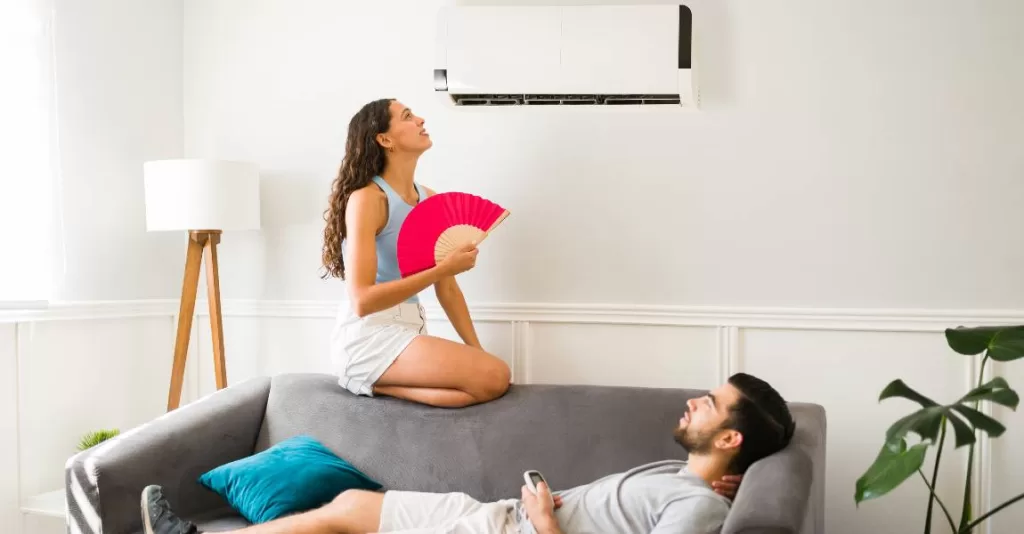
What Should I Do if my Air Conditioner is Blowing Hot Air?
If your air conditioner is blowing hot air, there are a few things you can do to troubleshoot the issue before calling a professional.
Here are some steps you can take:
- Check the thermostat: Make sure it is set to the correct temperature and not accidentally set to “heat” mode.
- Check the air filter: A dirty air filter can restrict air flow and cause the AC to blow hot air. Check the filter and replace it if it is dirty.
- Check the outdoor unit: Make sure the outdoor unit is not obstructed by debris or plants. Clear any debris and trim any plants that are blocking the unit.
- Check the refrigerant levels: Low refrigerant levels can cause the AC to blow hot air. If you suspect this is the issue, contact a professional.
- Check the condenser coils: Dirty condenser coils can also cause the AC to blow hot air. Clean the coils with a soft brush or contact a professional for a thorough cleaning.
- Check the ductwork: Leaking or damaged ductwork can cause the AC to blow hot air. Inspect the ductwork and seal any AC duct leaks or contact a professional for repairs.
If these steps do not resolve the issue, it may be time to contact a professional for further diagnosis and repair.
What to do When Air Conditioning has an Uneven Temperature Distribution
If you’re experiencing uneven temperature distribution in your home, it can be frustrating and uncomfortable, especially during the hot summer months when you rely on your air conditioning system to keep you cool.
Here are some steps you can take to address this issue:
- Check your air filters: One of the most common causes of uneven temperature distribution is dirty air filters. Dirty filters can restrict airflow, causing certain areas of your home to receive less cool air.
- Inspect your ductwork: Leaky or poorly insulated ductwork can cause uneven temperature distribution. Check your ductwork for any AC duct leaks or damage and repair them if necessary. Consider insulating your ductwork to prevent heat loss.
- Adjust your air vents: Make sure your air vents are open and not blocked by furniture or other obstructions. You can also adjust the vents to direct more cool air to certain areas of your home.
- Consider a zoning system: A zoning system allows you to control the temperature in different areas of your home independently. This can be especially useful if you have rooms that are warmer or cooler than others.
- Schedule a maintenance appointment: If none of the above steps solve your problem, it may be time to schedule a maintenance appointment with a professional HVAC technician. They can inspect your system and identify any underlying issues that may be causing the uneven temperature distribution.
By following these steps, you can improve the performance of your air conditioning system and enjoy a more comfortable home environment.
Air Conditioner is Making Loud Noises
If your air conditioner is making loud noises, addressing the issue as soon as possible is important. There are several reasons why this could be happening, including:
Loose or damaged components: Over time, the various components of your air conditioner can become loose or damaged, causing them to rattle or vibrate. This can include the fan blades, motor mounts, or even the compressor.
- Dirty or clogged air filters: If your air filters are dirty or clogged, it can cause your air conditioner to work harder than it needs to, leading to excessive noise. It is essential to regularly clean or replace your air filters to prevent this from happening.
- Low refrigerant levels: If your air conditioner is low on refrigerant, it can cause your compressor to work harder than it should, leading to excessive noise. This can also cause your system to freeze, leading to costly repairs.
- Faulty fan motor: If your fan motor is faulty, it can cause your air conditioning unit to make loud noises. This is because the motor struggles to spin the fan blades, which can cause a grinding or rattling noise.
- Blocked or dirty condenser coils: If your condenser coils are blocked or dirty, it can cause your air conditioner to work harder than it should, leading to weird noises. This can also cause your system to overheat, leading to costly repairs.
If your air conditioner is making loud strange noises, it is crucial to address the issue immediately to prevent further damage to your system. Contact a professional HVAC technician to diagnose and repair the issue.
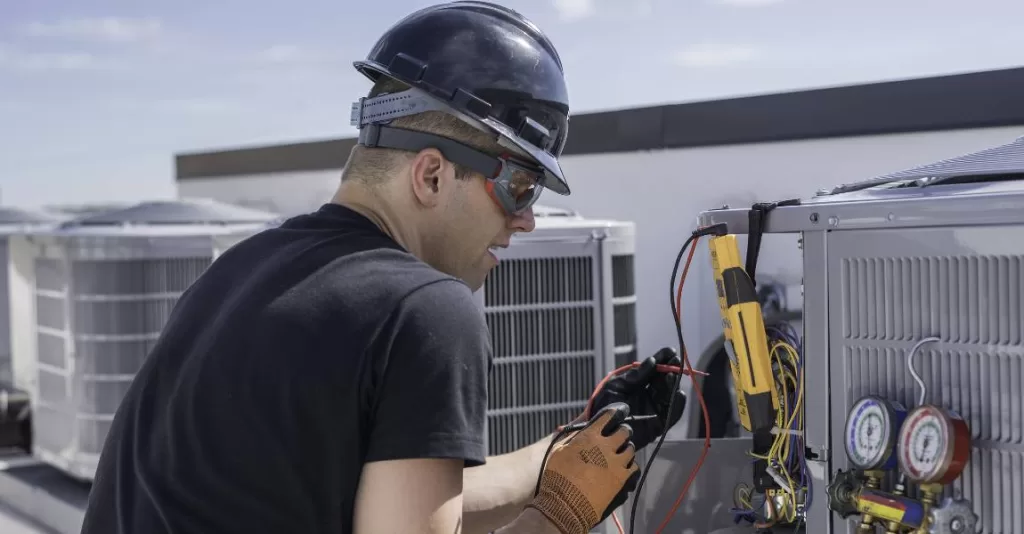
Can a Programmable Thermostat Go Bad?
Yes, a programmable thermostat can go bad like any other electronic device. Here are some signs that your programmable thermostat may be malfunctioning:
- The thermostat is not responding to changes in temperature settings.
- The temperature readings on the thermostat are inaccurate or inconsistent.
- The thermostat is not turning on or off when it’s supposed to.
- The thermostat is displaying error messages or flashing lights.
If you suspect that your programmable thermostat is not functioning correctly, here are some common thermostat solutions:
1. Check the power source: Ensure the thermostat receives power. Check the batteries or the electrical connection to ensure that it’s not the power source causing the issue.
2. Check the wiring: If the wiring is loose or damaged, it can cause the thermostat to malfunction. Turn off the power and check the wiring connections, or call a professional electrician to do it for you.
3. Reset the thermostat: Sometimes, resetting the thermostat can fix the thermostat settings issue. Follow the manufacturer’s instructions to reset the thermostat to its default settings.
4. Replace the thermostat: If none of the above solutions work, it may be time to replace it. Consult a professional HVAC technician to help you choose the right thermostat for your home and install it properly.
In conclusion, a programmable thermostat can go bad, but there are solutions to fix the issue. Regular maintenance and checking the thermostat’s settings can help prevent malfunctions. If you suspect a problem, it’s best to address it promptly to avoid further complications.
What is HVAC Failure?
HVAC failure refers to the malfunction or breakdown of heating, ventilation, and air conditioning systems. This failure can occur due to various reasons, such as poor maintenance, wear and tear, electrical issues, and system overload.
HVAC systems are essential for maintaining comfortable indoor temperatures, humidity levels, and air quality, and any failure can lead to discomfort, health hazards, and even property damage.
HVAC failure can result in a range of issues, including inadequate heating or cooling, poor air quality, and increased energy bills. It is important to regularly maintain and service HVAC systems to prevent failure and ensure optimal performance and efficiency.
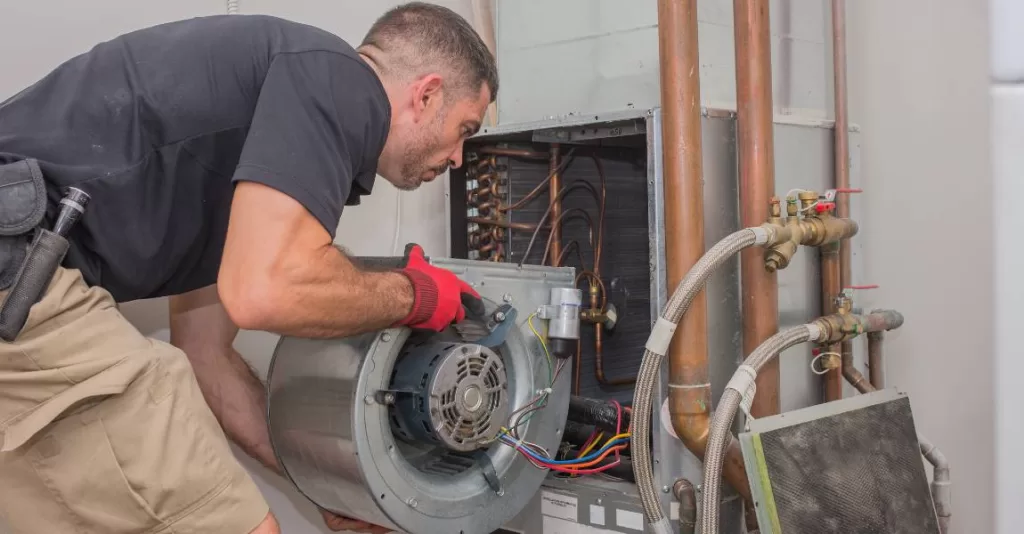
FAQ’s
What’s the Lifespan of an HVAC System?
The average lifespan of an HVAC unit is approximately 15-20 years, with proper maintenance and regular servicing. However, factors such as usage, climate, and installation quality can impact an HVAC unit’s lifespan. It is recommended to have regular maintenance and inspections to ensure optimal performance and longevity of the unit.
How often should I replace my HVAC air filter?
It’s recommended to replace your air filter every 1-3 months, depending on how often you use your HVAC system and the level of pollutants in your home.
Why is my HVAC system not turning on?
This could be due to a variety of issues, such as a tripped circuit breaker, a malfunctioning thermostat, or a faulty capacitor. It’s best to have a professional HVAC technician diagnose and fix the problem.
Why is my HVAC system leaking water?
A clogged condensate drain line or a faulty condensate pump can cause water to leak from the HVAC system. A professional can clean the drain line or replace the pump if necessary.
Why is my HVAC system emitting a foul odor?
A foul odor could be caused by a dirty air filter, mold or mildew growth in the ductwork or evaporator coil, or a problem with the drainage system. It’s important to have a professional inspect and clean the system to eliminate odor and prevent potential health hazards.
Conclusion
In conclusion, if left unaddressed, HVAC problems can be a significant inconvenience and cause health and safety risks.
However, many common HVAC problems can be easily fixed with the proper knowledge and tools. Regular maintenance and timely repairs can also prevent these problems from occurring in the first place.
If you are experiencing HVAC problems or need maintenance services, contact a qualified HVAC service technician today to schedule an appointment. Don’t let HVAC problems compromise your comfort and safety at home or work.





